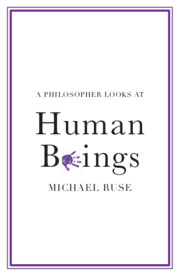Book contents
- A Philosopher Looks at Human Beings
- A Philosopher Looks at
- A Philosopher Looks at Human Beings
- Copyright page
- Dedication
- Contents
- Acknowledgments
- Introduction
- 1 The Status of Humans
- 2 Mechanism versus Organicism
- 3 Darwinian Evolution
- 4 Mechanism and Human Nature
- 5 Organicism and Human Nature
- 6 The Problem of Progress
- 7 Morality for the Organicist
- 8 Morality for the Mechanist
- Epilogue
- Bibliography
- Index
3 - Darwinian Evolution
Published online by Cambridge University Press: 20 May 2021
- A Philosopher Looks at Human Beings
- A Philosopher Looks at
- A Philosopher Looks at Human Beings
- Copyright page
- Dedication
- Contents
- Acknowledgments
- Introduction
- 1 The Status of Humans
- 2 Mechanism versus Organicism
- 3 Darwinian Evolution
- 4 Mechanism and Human Nature
- 5 Organicism and Human Nature
- 6 The Problem of Progress
- 7 Morality for the Organicist
- 8 Morality for the Mechanist
- Epilogue
- Bibliography
- Index
Summary
Humans are the end point of almost four billion years of evolution. The generally accepted explanatory theory is Charles Darwin’s theory of evolution through natural selection, brought on by a struggle for existence. Darwin bolstered his case through a “consilience of inductions,” showing how evolution through selection explained in many areas right across the life sciences – behavior, fossil record, geographical distributions, morphology, taxonomy, and embryology. The missing element was an adequate theory of heredity, supplied by the Moravian monk Gregor Mendel. A major problem was why random change in the units of heredity, mutations of the genes, should provide enough suitable material for selection to work on. Theodosius Dobzhansky solved this problem by hypothesizing that all populations contain much variation, quite enough for selection to work on. His student, Richard Lewontin, using molecular techniques – gel electrophoresis – showed that Dobzhansky’s hypothesis was right.
Keywords
- Type
- Chapter
- Information
- A Philosopher Looks at Human Beings , pp. 48 - 74Publisher: Cambridge University PressPrint publication year: 2021

